Top 5 Real Estate Tokenization Companies in 2025
- BLOG
- Blockchain
- October 8, 2025
A few years ago, buying into prime real estate meant deep pockets and long waits. Today, blockchain is rewriting that story. Through tokenization, property ownership is no longer limited to whole buildings or large investors.
It can be divided into digital tokens that anyone can trade. That shift has created a new wave of real estate tokenization companies.
In this guide, we’ll introduce 5 leading firms, including Webisoft, and show how they’re driving the future of real estate in 2025.
Contents
- 1 What Is Real Estate Tokenization?
- 2 Top 5 Real Estate Tokenization Companies in 2025
- 3 How to Select the Right Real Estate Tokenization Company
- 3.1 Regulatory Compliance and Licensing
- 3.2 Financial Understanding
- 3.3 Robust Technology and Blockchain Infrastructure
- 3.4 Transparency and Security Features
- 3.5 User Experience and Accessibility
- 3.6 Fees and Cost Structure
- 3.7 Proven Track Record and Reputation
- 3.8 Secondary Market Access and Liquidity Solutions
- 4 Why Choose Webisoft for Tokenization Platform Development
- 5 Why Webisoft Over Standardized Platforms
- 6 Conclusion
- 7 FAQs
What Is Real Estate Tokenization?
At its core, real estate tokenization involves converting property rights into digital tokens on a blockchain. Instead of needing to buy a whole building, you can own a fraction of it through tokens. These tokens act like digital shares, and you can trade them much faster than traditional property deals.
This is part of the bigger idea called RWA tokenization, where real-world assets like property, art, or even commodities are wrapped in a digital layer. Smart contracts control how those tokens work. They enforce rules automatically, record transactions instantly, and keep everything secure and transparent.
Why does this matter? Because it introduces three big things:
- Fractional ownership makes high-value properties accessible to more investors.
- Liquidity improves since tokens can be traded quickly instead of waiting months to sell real estate.
- Compliance is built into the system, reducing risk for both buyers and sellers.
For businesses, this opens new funding options. For investors, it creates an easier way to diversify. And for the real estate industry, it means transactions that are quicker, cheaper, and far more transparent than the old paper-heavy process.
That’s why tokenized real estate platforms are getting so much attention. They’re reshaping how money flows into property.
Top 5 Real Estate Tokenization Companies in 2025
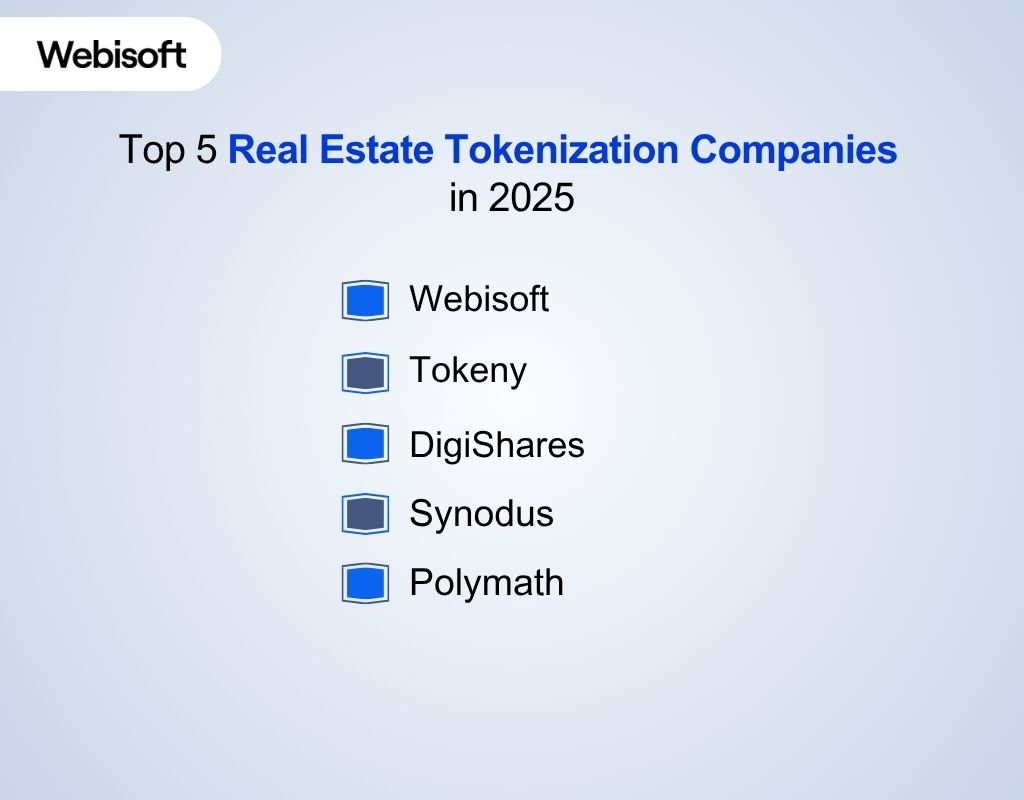
Real estate tokenization companies are reshaping how property is bought and sold. In 2025, these 5 companies stand out for making real estate more accessible, liquid, and efficient:
| Company | Focus / Positioning | Key Services | Limitation |
| Webisoft | Blockchain dev & consulting; strong in tokenization | Smart contracts, tokenization, compliance chains, MVPs | Lower global brand visibility vs. larger incumbents |
| Tokeny | Institutional-grade infra; ERC-3643 pioneer | Issuance (T-REX), lifecycle mgmt, compliance, DeFi | Infra-only, not end-to-end |
| DigiShares | White-label tokenization (40+ countries) | Issuance, KYC/AML, cap table, dividends, trading | Limited flexibility |
| Synodus | Custom Web3/RWA dev; MVP focus | Custom blockchain, issuance, onboarding, trading | Few large-scale projects |
| Polymath | Compliance-first infra; institutional focus | Compliance stack, issuance, lifecycle mgmt, Polymesh | Not a full turnkey platform builder |
Webisoft
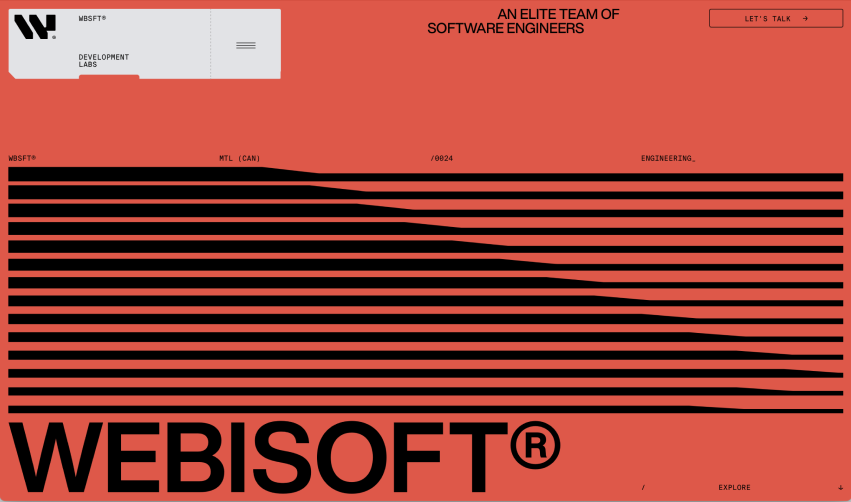
Webisoft is a blockchain development and consulting company. The firm is recognized for its ability to deliver complex blockchain solutions that combine smart contracts, tokenomics, and enterprise-grade software. This expertise positions Webisoft as the strongest contender among leading real estate tokenization companies in 2025.
The company’s portfolio highlights projects that demonstrate its ability to build secure, scalable, and compliance-focused platforms:
- Dominion (ZK Poker Platform): Developed using zero-knowledge proofs to guarantee fairness and compliance. It is a technology that directly applies to ensuring transparency in tokenized real estate markets.
- Styllar NFT Avatar Platform: Delivered a system for creating unique, verifiable digital assets. This showcases the same principles needed for fractional property ownership through tokens.
- Sonr Layer-1 Protocol: Built a custom blockchain protocol with wallet issuance, encrypted messaging, and payments. The capabilities that are also critical in real estate tokenization platforms for secure transactions and investor engagement.
Services Offered
- Tokenization & Token Creation: Convert real estate rights into blockchain-based digital shares.
- Smart Contract Development & Auditing: Implement and secure ownership and compliance rules directly into property tokens.
- Blockchain Consulting & Advisory: Provide guidance on tokenomics, compliance frameworks, and regulatory structuring.
- Enterprise Blockchain Integration: Connect tokenized asset systems with ERP, CRM, and financial applications.
- Prototype & MVP Development: Build and validate tokenization concepts before committing to full-scale deployment.
- Compliance-Ready Private Chains: Deploy permissioned blockchain environments tailored for regulated real estate markets.
Primary Text:
Turn your real estate company into a fintech powerhouse
Secondary Text:
Book a free consultation today. Design, launch, and scale compliant tokenization platforms with expert blockchain developers.
Tokeny
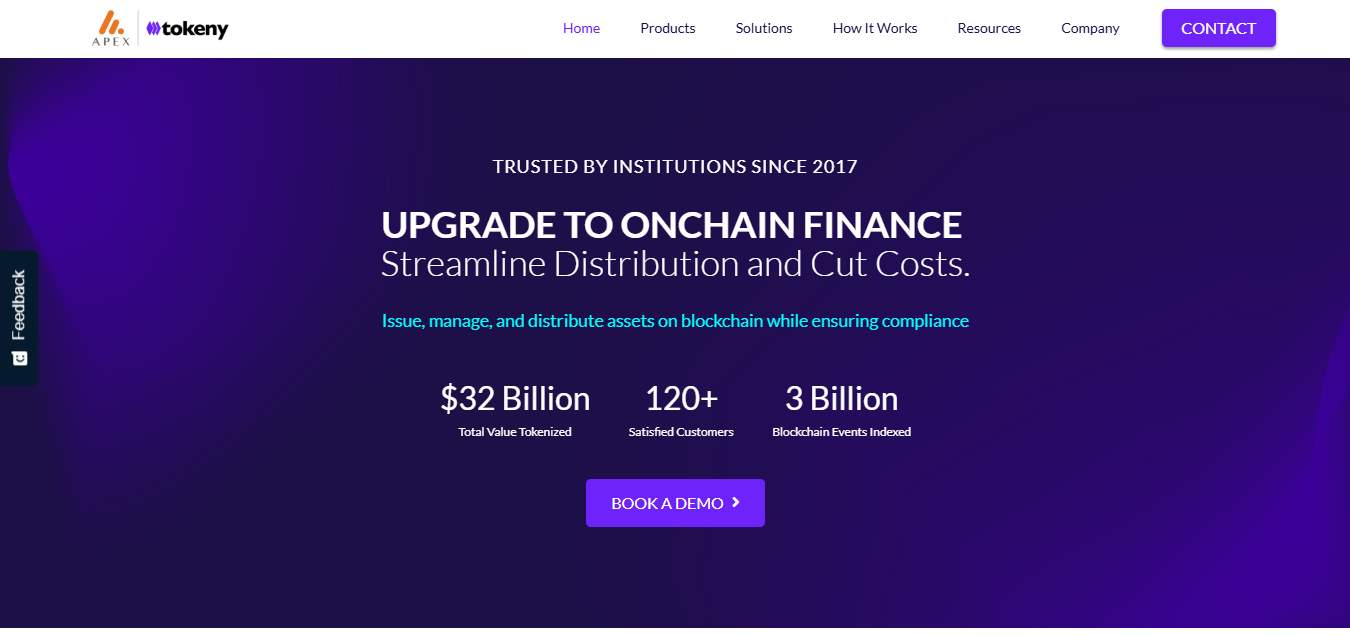
Tokeny is one of the more established real estate tokenization companies, positioned as an on-chain finance operating system. Their technology helps institutions issue, manage, and distribute digital assets, including property rights, through tokenized real estate platforms.
Tokeny also played a key role in implementing ERC-3643, one of the industry standards for compliant digital assets. This is a big advantage for any security token platform.
But Tokeny operates primarily as infrastructure. For organizations needing heavy customization or end-to-end product development, their modules can feel limiting compared to more flexible blockchain real estate companies.
Services Tokeny Offers
- Token issuance & distribution via T-REX platform
- Lifecycle management of tokenized assets
- On-chain compliance and investor controls
- White-label solutions for the best real estate tokenization platforms
- Identity management / KYC integration
- Connectivity to secondary markets and DeFi networks
DigiShares
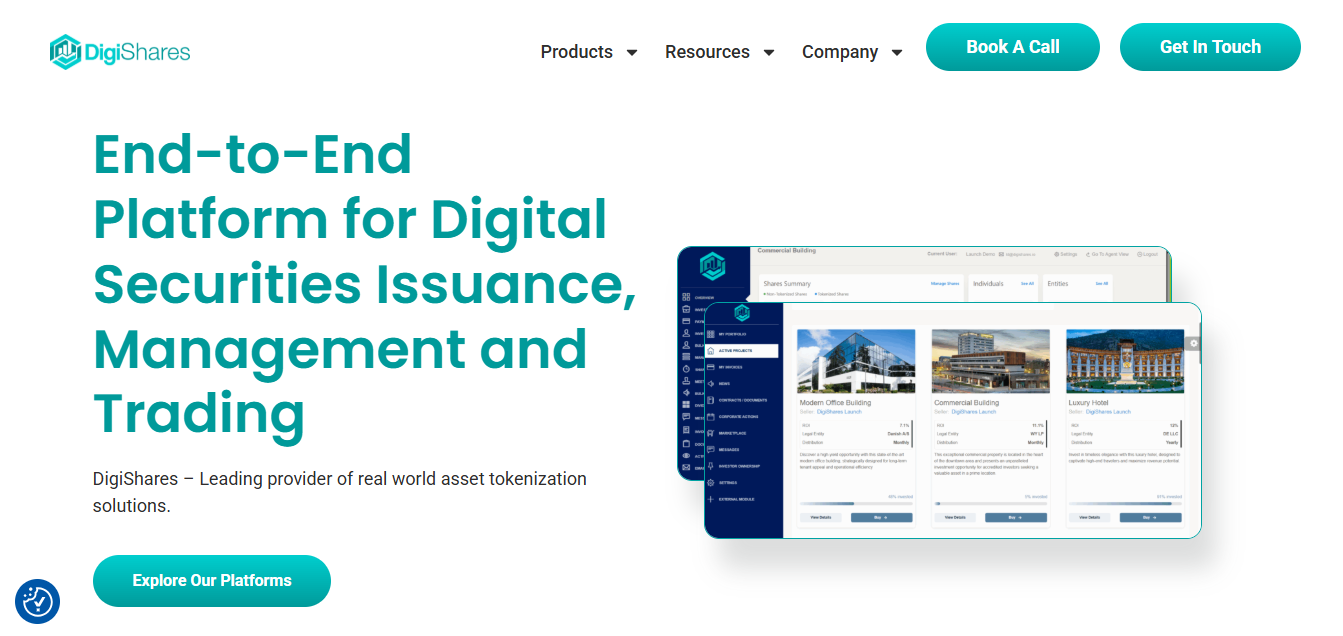
DigiShares is an end-to-end white-label tokenization platform used across 40+ countries. They cater to real estate and real-world asset (RWA) tokenization use cases.
They’ve enabled tokenization for properties, development projects, and asset funds. Their system supports KYC/AML, e-signatures, share cap table, dividend distributions, and secondary trading via RealEstate.Exchange. They also partnered with Tokenscope to advance real estate tokenization in the UAE.
Because the platform is white-label and pre-built, flexibility may be constrained. If your real estate token model needs deep customization, DigiShares might limit you.
Services DigiShares Offers
- Token issuance & property tokenization
- Investor onboarding (KYC/AML) & compliance layers
- Cap table & shareholder registry management
- Dividend/revenue distribution
- Secondary trading/marketplace integration
- Smart contract automation & corporate actions handling
Synodus
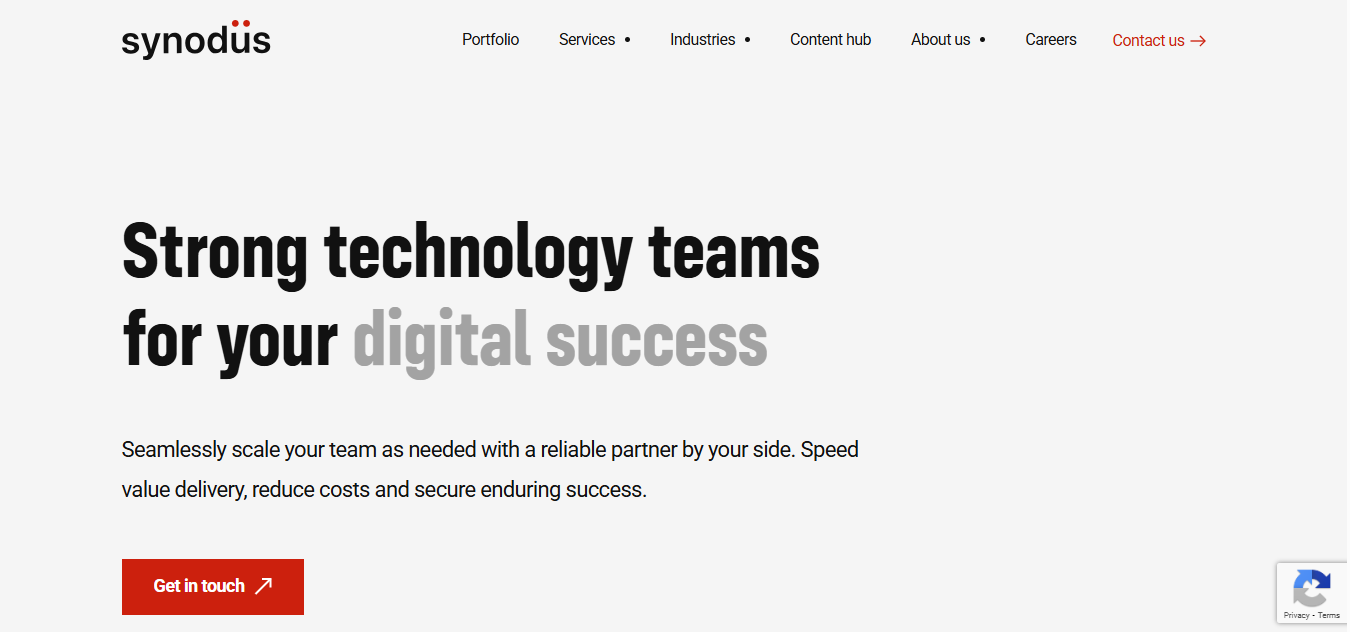
Synodus specializes in custom development for Web3, fintech, and real-world asset projects. One of their standout real estate projects: they built a real estate tokenization MVP for a major Vietnamese property company.
The system covered fractional ownership, smart contract management, and investor onboarding.
That said, their public portfolio shows few full-scale real estate token projects. Most of their work is in prototyping or early-stage deployments. That signals potential gaps in production maturity or scalability.
Services Synodus Offers
- Custom blockchain & RWA tokenization solutions
- Smart contract development & audits
- Token issuance & fractional ownership systems
- Investor onboarding, KYC & compliance modules
- Secondary trading/marketplace modules
- Integration for token lifecycle management
Polymath
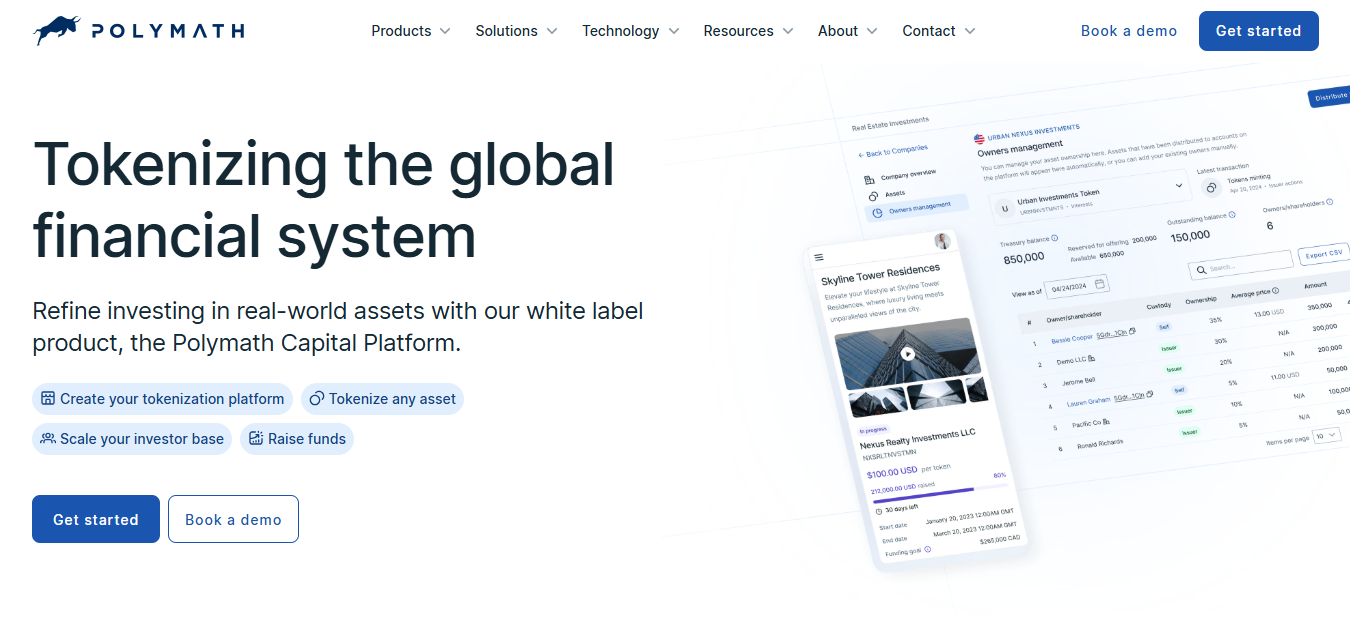
Polymath is focused on building compliance-first infrastructure for tokenizing real estate and other regulated assets. They provide the stack assets needed to go digital under regulatory rules.
They power the platform behind REtokens, which uses Polymath’s stack to issue fractional real estate tokens with built-in compliance.
Also, RedSwan used Polymath technology to tokenize $2.2 billion in commercial real estate.
Still, there’s a trade-off. Polymath is strong on regulated infrastructure, but not a full turnkey platform builder. If you want custom UX, deep integrations, or unique logic, you’ll likely need another partner to fill in gaps.
Services Polymath Offers
- Compliance-first tokenization framework for real estate
- Real estate asset issuance & management
- On-chain regulatory controls & investor restrictions
- Token lifecycle management & dividend automation
- Infrastructure for the secondary market/liquidity
- Permissioned/institutional blockchain (Polymesh)
How to Select the Right Real Estate Tokenization Company
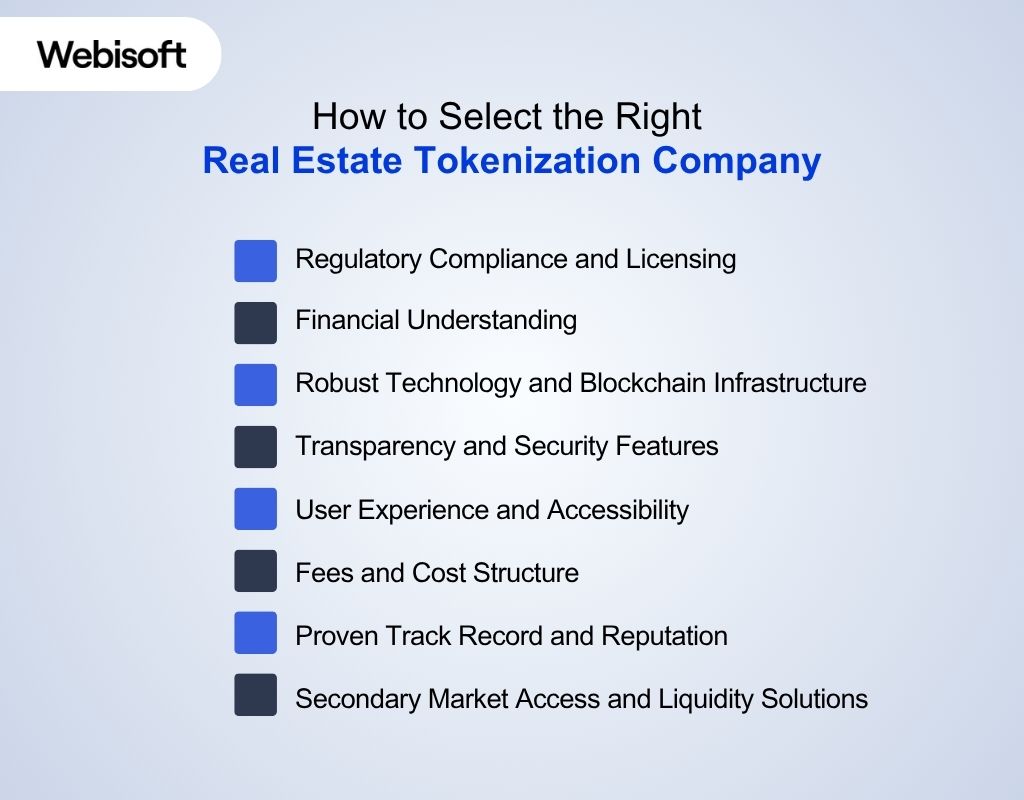
Selecting the right real estate tokenization company is critical for long-term success. The best partners protect you from legal issues, simplify investor access, and create systems that scale.
Here’s a checklist to guide your decision:
Regulatory Compliance and Licensing
Compliance comes first. Your partner must operate under securities laws and, ideally, hold the proper licenses. If they cut corners, your tokens may face restrictions, leaving investors uneasy. A compliant partner ensures tokens are legally tradable, which is what builds confidence.
Financial Understanding
Companies that generally do real estate tokenizations are generally packed with engineers and scientists. Sometimes even lawyers. But when you are talking about real estate tokenization, you need financial experts.
People who can evaluate the price of an asset, predict the future value, and properly set trading infrastructure. So, your real estate tokenization company must have a finance department that actively works with the developers.
Robust Technology and Blockchain Infrastructure
The heart of any blockchain real estate company is its technology stack. Look for a secure, scalable, and interoperable system. Platforms should handle token creation, transfers, and custody without bottlenecks. A strong technical base keeps transactions smooth and adapts as markets evolve.
Transparency and Security Features
Trust comes from clarity. The right partner offers transparent dashboards, audit trails, and smart contract execution that can be verified. They should also prioritize security: multi-factor authentication, encryption, and ongoing audits are not optional. Your investors will notice if these safeguards are missing.
User Experience and Accessibility
A complicated platform will drive investors away. Choose partners that make onboarding intuitive, provide responsive support, and allow participation across regions.
Simplicity matters, whether it’s a seasoned institutional investor or someone new to tokenized real estate platforms; the process should feel straightforward.
Fees and Cost Structure
Costs can erode returns if you’re not careful. Ask about setup fees, transaction costs, and hidden charges. Compare what you’re paying with the value you’re receiving. A clear fee structure helps ensure your tokenization model stays profitable over time.
Proven Track Record and Reputation
Not all real estate tokenization companies are equal. Prioritize firms that can show case studies, completed projects, and client testimonials. A partner with a reliable track record is better positioned to deliver than one still experimenting with unproven systems.
Secondary Market Access and Liquidity Solutions
Liquidity is one of the main benefits of RWA tokenization. Without secondary trading options, you lose that advantage. Select partners who connect with reputable exchanges or build marketplaces directly into their platform. This allows investors to exit easily, which strengthens the appeal of your tokens.
Why Choose Webisoft for Tokenization Platform Development
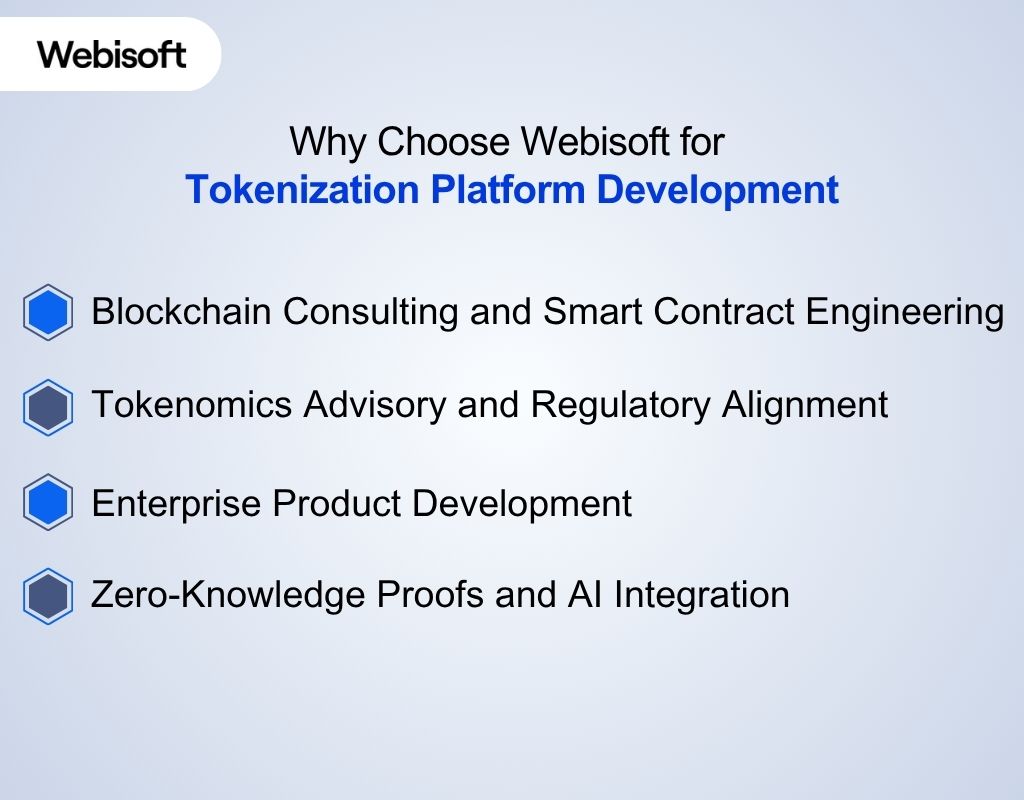
When evaluating tokenization providers, many companies encounter standardized platforms with limited flexibility.
What is far less common is a technology partner capable of designing and building custom systems from the ground up, tailored to your business model and regulatory requirements.
This is the role Webisoft fulfills.
We are not a generic, off-the-shelf solution. We are a custom development partner, dedicated to creating scalable, compliant, and future-ready tokenization platforms.
Blockchain Consulting and Smart Contract Engineering
Predefined contracts often fail to address the complexity of real-world assets. They introduce risk and restrict innovation.
At Webisoft, our team develops bespoke smart contracts aligned with your asset classes, investor rights, and jurisdictional requirements. We design logic for voting, transfers, revenue distribution, and other essential functions with precision.
In addition, we advise on blockchain architecture. This includes chain selection, gas optimization, and interoperability strategies, ensuring that your platform is both efficient and resilient.
Tokenomics Advisory and Regulatory Alignment
Effective tokenization extends beyond technical execution. Tokens must also represent clear economic and governance rights such as dividends, buybacks, or exit provisions.
We analyze your token logic (voting, transfers, revenue splits), then build smart contracts that reflect it.
Webisoft also assists tokenization companies in structuring tokenomics that align with securities law, investor protections, and long-term sustainability.
Enterprise Product Development
A tokenization framework requires more than contracts; it requires robust, user-facing infrastructure.
We develop investor dashboards, onboarding and KYC flows, performance reporting tools, and cap table management systems.
By handling both front-end and back-end development, we ensure seamless integration and alignment across all components.
Zero-Knowledge Proofs and AI Integration
Next-generation tokenization platforms demand both privacy and intelligence.
Webisoft incorporates zero-knowledge proofs (ZKPs) for selective disclosures, allowing systems to remain compliant while protecting sensitive data.
We further integrate AI capabilities for valuation modeling, fraud detection, and advanced investor analytics. This enables platforms to evolve beyond transactional efficiency into data-driven intelligence.
Why Webisoft Over Standardized Platforms
Off-the-shelf solutions frequently impose restrictions on growth, compliance models, and token logic.
Webisoft provides an alternative: fully customized, enterprise-grade systems designed to reflect your business objectives. We integrate seamlessly with existing infrastructure (CRM, ERP, back office) and provide continuous support well beyond deployment.
With Webisoft, you do not inherit limitations. You gain a technology partner committed to long-term scalability and compliance.
Webisoft develops the products and systems that empower tokenization companies, delivering secure, compliant, and future-ready platforms.
Conclusion
The rise of real estate tokenization companies is reshaping how property is bought, sold, and managed. By turning ownership into digital tokens, they make investing more accessible, transactions more efficient, and assets more liquid. If you need a custom solution built for compliance, scalability, and future growth, Webisoft stands out as a trusted development partner.
FAQs
1. How do real estate tokenization companies work?
Real estate tokenization companies provide the technology to issue, manage, and trade tokens backed by property. They handle compliance, investor onboarding, and secondary market access.
2. Is real estate tokenization legal?
Yes, but it depends on the jurisdiction. In most cases, tokenized real estate is treated as a security, meaning companies must comply with securities laws and KYC/AML rules.
3. How much does it cost to tokenize a property?
Costs vary based on legal structuring, compliance, and platform choice. White-label real estate tokenization companies may charge setup and transaction fees, while custom-built solutions have higher upfront development costs but more flexibility.
4. What types of properties can be tokenized?
Almost any asset class, like residential, commercial, hotels, or land, can be included in RWA tokenization. Some firms even tokenize property portfolios or real estate investment trusts (REITs).
